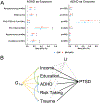The Relationship of Attention-Deficit/Hyperactivity Disorder With Posttraumatic Stress Disorder: A Two-Sample Mendelian Randomization and Population-Based Sibling Comparison Study
- PMID: 36335070
- PMCID: PMC10496427
- DOI: 10.1016/j.biopsych.2022.08.012
The Relationship of Attention-Deficit/Hyperactivity Disorder With Posttraumatic Stress Disorder: A Two-Sample Mendelian Randomization and Population-Based Sibling Comparison Study
Abstract
Background: Attention-deficit/hyperactivity disorder (ADHD) and posttraumatic stress disorder (PTSD) are associated, but it is unclear if this is a causal relationship or confounding. We used genetic analyses and sibling comparisons to clarify the direction of this relationship.
Methods: Linkage disequilibrium score regression and 2-sample Mendelian randomization were used to test for genetic correlation (rg) and bidirectional causal effects using European ancestry genome-wide association studies of ADHD (20,183 cases and 35,191 controls) and 6 PTSD definitions (up to 320,369 individuals). Several additional variables were included in the analysis to verify the independence of the ADHD-PTSD relationship. In a population-based sibling comparison (N = 2,082,118 individuals), Cox regression models were fitted to account for time at risk, a range of sociodemographic factors, and unmeasured familial confounders (via sibling comparisons).
Results: ADHD and PTSD had consistent rg (rg range, 0.43-0.52; p < .001). ADHD genetic liability was causally linked with increased risk for PTSD (β = 0.367; 95% CI, 0.186-0.552; p = 7.68 × 10-5). This result was not affected by heterogeneity, horizontal pleiotropy (Mendelian randomization Egger intercept = 4.34 × 10-4, p = .961), or other phenotypes and was consistent across PTSD datasets. However, we found no consistent associations between PTSD genetic liability and ADHD risk. Individuals diagnosed with ADHD were at a higher risk for developing PTSD than their undiagnosed sibling (hazard ratio = 2.37; 95% CI, 1.98-3.53).
Conclusions: Our findings add novel evidence supporting the need for early and effective treatment of ADHD, as patients with this diagnosis are at significantly higher risk to develop PTSD later in life.
Keywords: ADHD; Causal inference; Comorbidities; Epidemiology; Genome-wide association study; PTSD.
Copyright © 2022 Society of Biological Psychiatry. Published by Elsevier Inc. All rights reserved.
Conflict of interest statement
Figures


Comment in
-
Analysis of the Relationship of Attention-Deficit/Hyperactivity Disorder With Posttraumatic Stress Disorder Clarifies Relationship Directionality.Biol Psychiatry. 2023 Feb 15;93(4):e11-e12. doi: 10.1016/j.biopsych.2022.12.001. Biol Psychiatry. 2023. PMID: 36653108 No abstract available.
References
-
- Kessler RC, Wang PS (2008): The descriptive epidemiology of commonly occurring mental disorders in the United States. Annu Rev Public Health. 29:115–129. - PubMed
-
- Yehuda R, Hoge CW, McFarlane AC, Vermetten E, Lanius RA, Nievergelt CM, et al. (2015): Post-traumatic stress disorder. Nat Rev Dis Primers. 1:15057. - PubMed
-
- Spencer AE, Faraone SV, Bogucki OE, Pope AL, Uchida M, Milad MR, et al. (2016): Examining the association between posttraumatic stress disorder and attention-deficit/hyperactivity disorder: a systematic review and meta-analysis. J Clin Psychiatry. 77:72–83. - PubMed
-
- Adler LA, Kunz M, Chua HC, Rotrosen J, Resnick SG (2004): Attention-deficit/hyperactivity disorder in adult patients with posttraumatic stress disorder (PTSD): is ADHD a vulnerability factor? J Atten Disord. 8:11–16. - PubMed
-
- Crum-Cianflone NF, Frasco MA, Armenta RF, Phillips CJ, Horton J, Ryan MA, et al. (2015): Prescription Stimulants and PTSD Among U.S. Military Service Members. J Trauma Stress. 28:585–589. - PubMed
Publication types
MeSH terms
Grants and funding
LinkOut - more resources
Full Text Sources
Medical

